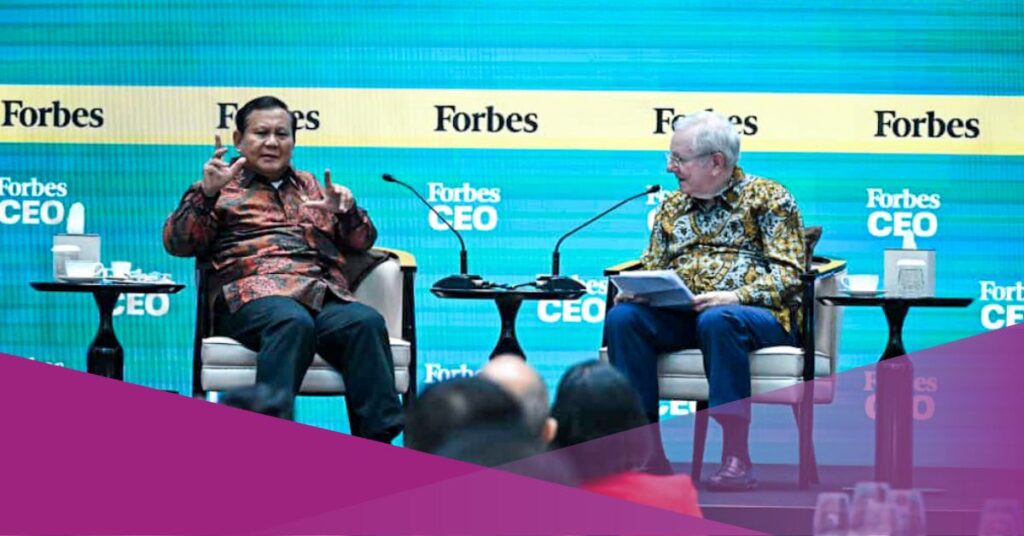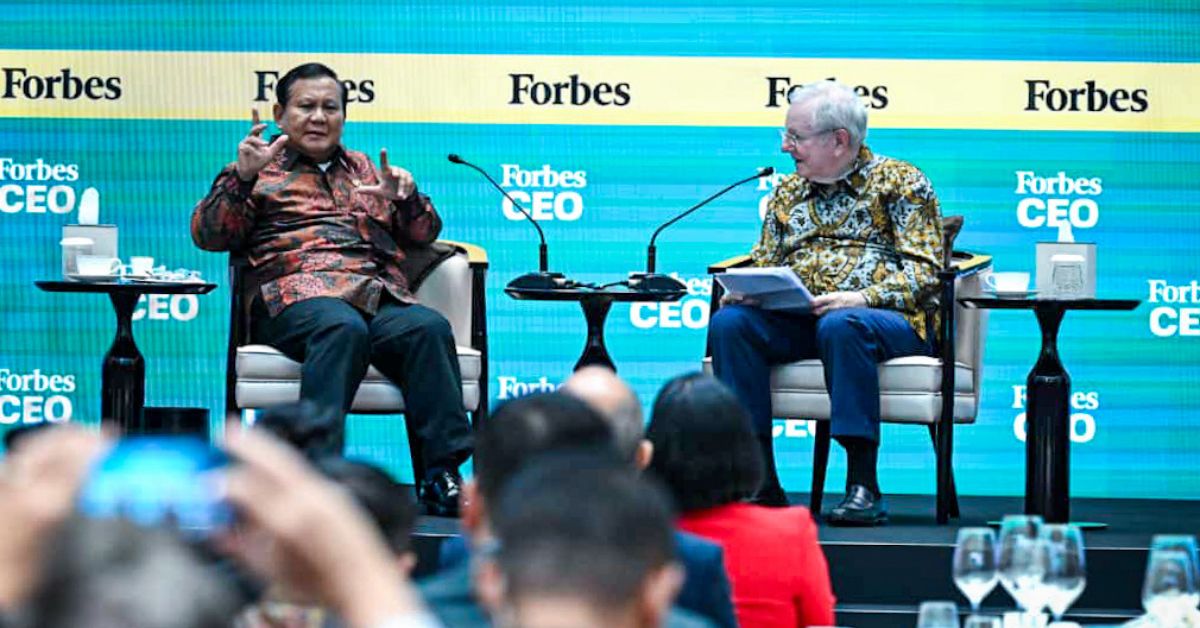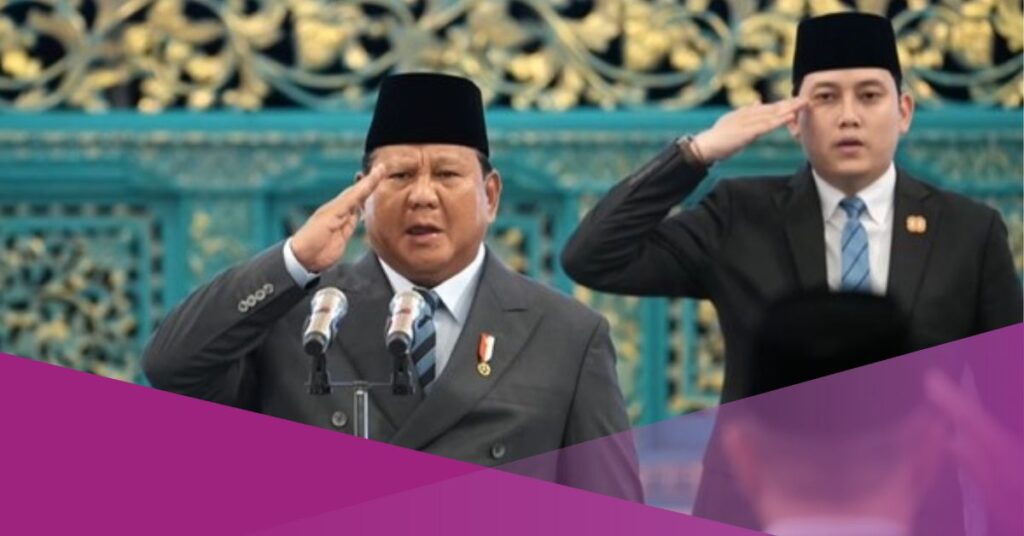President Prabowo Subianto has announced a sweeping policy shift allowing foreign nationals (WNA) to serve as top executives in state-owned enterprises (BUMN).
The new regulation, revealed during the Forbes Global CEO Conference in Jakarta on Wednesday evening, is part of a broader strategy to modernise the management of state corporations and align them with international business standards.
“We can now recruit the best talent globally,” Prabowo told Forbes Chairman and Editor-in-Chief Steve Forbes at the St. Regis Hotel. “I’ve changed the regulation. Now, expatriates, non-Indonesians, can lead our state-owned companies. I’m very excited.”
- The President of the Republic of Indonesia attended the Forbes Global CEO Conference 2025 at The St. Regis Hotel Jakarta, 15 October 2025. Source: setkab.go.id
The decision comes as Prabowo pushes for a major consolidation of Indonesia’s BUMN landscape, reducing the number of state enterprises from roughly 1,000 to between 200 and 240.
The president’s message was clear: for Indonesia to compete globally, its public companies must operate with the same efficiency, talent, and accountability as their international counterparts.
From National Control to Global Competence
Under Prabowo’s leadership, Indonesia’s BUMN reform agenda has taken on a new urgency. Long criticised for inefficiency, bureaucracy, and political appointments, many state-owned companies have struggled to deliver returns comparable to those of private or foreign-managed firms.
The President promised that the reform is about raising profitability and performance, not merely privatisation.
“We must run them with global business standards,” he said. “If we do, returns of one or two percent can grow. They must grow.”
The president’s remarks come amid broader reforms aimed at professionalising BUMN governance, ensuring that top management positions are filled based on merit and international expertise rather than political allegiance.
Garuda Indonesia Becomes the First Test Case
Just hours after Prabowo’s announcement, PT Garuda Indonesia (Persero) Tbk, the country’s national airline, became the first to implement the policy.
During its Extraordinary General Meeting of Shareholders (RUPSLB) held on October 15, 2025, two foreign executives were officially appointed to the airline’s board:
- Neil Raymond Mills, former CEO of Green Africa Airways, as Director of Transformation; and
- Balagopal Kunduvara, a former Divisional Vice President at Singapore Airlines, was appointed Director of Finance and Risk Management.
The appointments mark a historic moment for Indonesia’s aviation sector, signalling the government’s readiness to entrust strategic national enterprises to international expertise.
According to officials from Danantara, the BUMN holding entity overseeing Garuda, the two executives were chosen to bring “world-class management experience” and help the airline rebuild after years of financial turmoil.
“The President’s vision is clear—our BUMN leaders must think globally,” said Pandu Sjahrir, Chief Investment Officer of Danantara. “We will continue to prioritise Indonesia’s best talents, including our diaspora, but international professionals can help accelerate transformation and transfer knowledge.”
Foreign executives in BUMN are still legally bound by the same standards as Indonesian nationals.
While the reform is being lauded as progressive, it also raises questions about oversight and accountability. The Corruption Eradication Commission (KPK) was quick to remind the public that foreign executives in BUMN are still legally bound by the same standards as Indonesian nationals.
Budi Prasetyo, the commission’s spokesperson, confirmed that expatriate directors are subject to LHKPN (State Officials’ Wealth Report) obligations.
“Every state official, regardless of nationality, must declare their assets and income,” he said. “If a foreign executive in a BUMN commits fraud or corruption, the KPK has full authority to investigate.”
This measure, according to KPK, ensures that Indonesia’s push for global competitiveness does not come at the expense of integrity.
Parliament’s Conditional Approvals for The Appointed Foreign Executives
The move to open BUMN leadership to foreigners has been met with cautious optimism in Parliament. Rivqy Abdul Halim, a member of the House of Representatives’ Commission VI, expressed support but insisted on three key conditions:
- The appointment must be based on expertise, proven achievement, and professional capability.
- It should occur only when no qualified local talent is available.
- Transparency and strong oversight mechanisms must be enforced.
“We want BUMN to be strong, competitive, and beneficial for the people,” Rivqy said. “This is not just about globalisation—it’s about sustainable national growth.”
He added that foreign involvement should be viewed as a tool for knowledge transfer and capacity building, ensuring that Indonesian talent continues to develop and eventually leads these institutions independently.
A Bold Shift in Mindset
Prabowo’s policy reflects a pragmatic approach to leadership, one that values results over nationalism. In his view, bringing in global expertise is not about replacing Indonesian talent but expanding the country’s intellectual and managerial capital.
The policy also coincides with Indonesia’s broader economic reforms: streamlining business licensing through the Online Single Submission (OSS) system, reducing red tape, and implementing BKPM Regulation No. 5 of 2025, which lowered the paid-up capital requirement for foreign investors from Rp10 billion to Rp2.5 billion per business line.
Together, these policies aim to make Indonesia a more attractive, competitive, and credible destination for both investment and talent.
A Global Outlook for a New Indonesia
While critics argue that allowing foreigners to lead BUMN could dilute Indonesia’s sovereignty over strategic industries, yet supporters say that the reform is a necessary step for BUMN to shed inefficiencies and become global players.
In practice, the policy could usher in a new era for companies like Pertamina, PLN, and Bank Mandiri, many of which have global ambitions but remain tied to domestic bureaucracies. By introducing international executives, Indonesia hopes to import not just management expertise, but also corporate discipline, transparency, and innovation.
“We must think big, act boldly, and compete with the best,” Prabowo said. “Indonesia deserves nothing less.”
Whether this shift will transform BUMN into genuine global champions remains to be seen. But for now, Indonesia’s open-door policy for expatriate executives marks a historic turning point, one that blends national pride with international pragmatism, and redefines what it means to build a truly competitive economy in the 21st century.


































